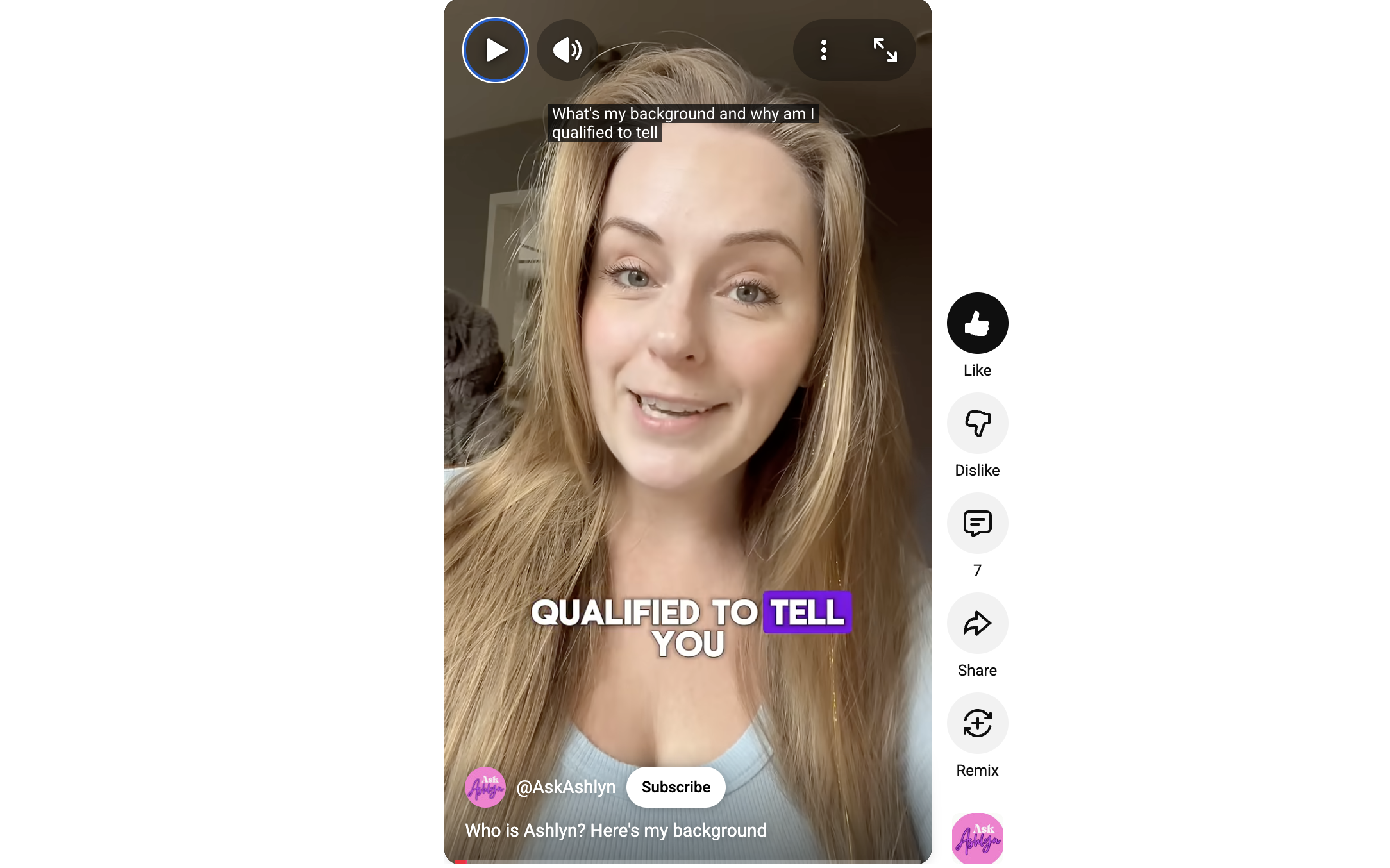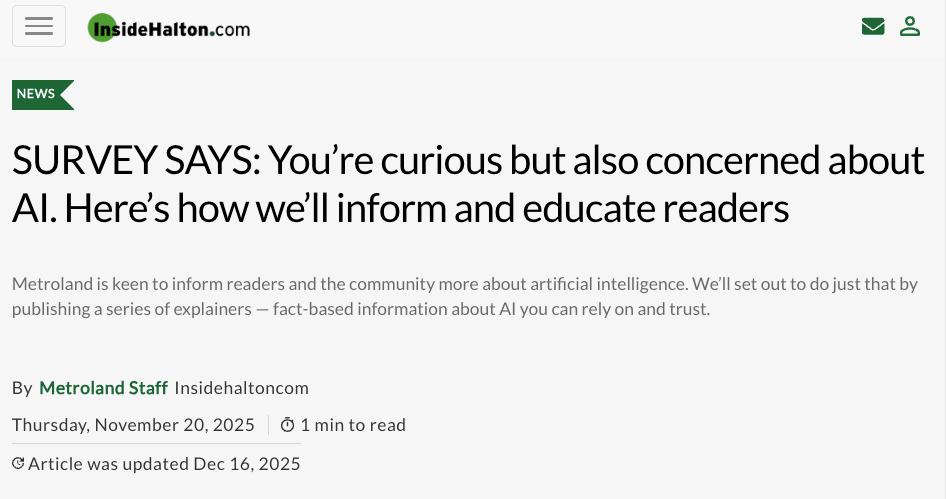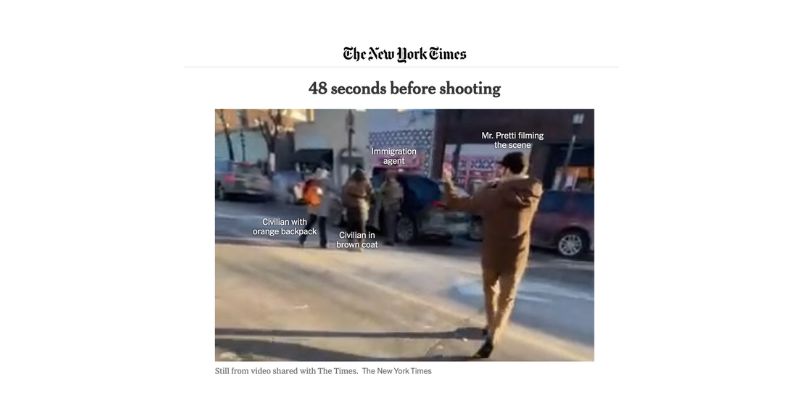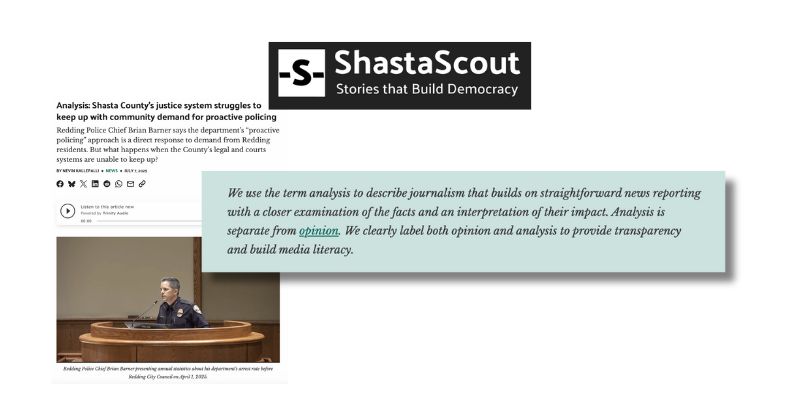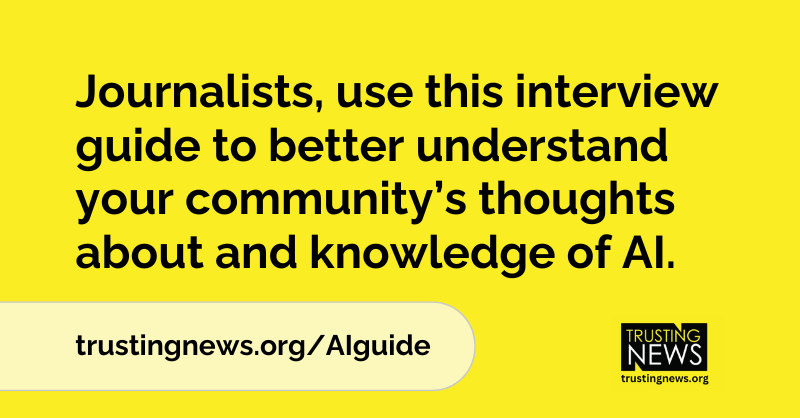
Trusting News is launching a new interview guide designed to help you understand what your community thinks about AI
Resource: AI community interview guide for journalists
Part of building trust (and building your audience) is first understanding your audience. This guide is designed to lead you through an interview or listening session with people in your community about AI: what they think it is, how they feel about it, how they feel about journalists using it and what they want to be informed about if journalists use it.
This guide lays out tips for setting up the conversation, as well as suggested questions to help guide your conversation. Questions? Feedback? Email us at info@TrustingNews.org. Find our other resources and strategies around AI use by journalists in our AI Trust Kit.
Tips for the conversation
While this conversation is focused specifically on learning about how the community member feels about AI and its use by journalists, the general information below is also important to keep in mind because of the current low levels of trust in news.
- This is not a debate. Your goal is to listen and learn. If the interviewee says things about journalism, or about your work specifically, that you’d like to correct or defend against, try to save those points for the end. We do hope that the subjects’ interactions with you help them understand and relate to journalists, and it’s OK to explain your credibility and best practices. But the primary goal of the conversation is to listen and understand, not bring them to your side, and not to win an argument. If you notice yourself feeling defensive, that’s normal! But keep your eyes on your goals. Think of this as an opportunity to hold your newsroom accountable for issues you may not have considered.
- When possible, keep the conversation focused on your work and journalism in your community. When participants talk about “the media,” invite them to get more specific.
- Also invite specificity if terms like “objectivity,” “bias” and “agenda” come up. Ask what they mean by the term.
- Explain what you’re doing ahead of time. Once you sit down with the person (we recommend these be done in person or over Zoom so you can see body language and facial expressions) explain what you are doing and why. Help set the expectation of what kind of questions you’re going to ask, to help them feel at ease. Also, explain that what they share will not be published without their permission. You’re not there to do a story. You’re there to learn and listen.
- We also encourage you, when appropriate, to acknowledge any place of privilege and positions of power you hold, even as the journalist hosting the conversation. Acknowledge that your news organization may have lost trust over the years, but that you’re striving to do better and want to understand issues facing your community.
Who to talk to, and how to find them
When thinking about who to talk to, we encourage you to find people who are likely to have a wide range of comfort levels with AI and familiarity with how the news works. You’ll likely hear many different perspectives from people who went to college and now work in tech-oriented fields than you would from people who don’t spend much time on computers and aren’t sure what we mean when we talk about AI. The entire spectrum is useful and important. We recommend making clear in your invitation that any level of familiarity is helpful.
Once you’ve identified the range of people you want to hear from, think about how you can reach people. It is fine in this case to talk to people you know. Feel free to ask neighbors and friends. One exception: You don’t want people who have insider knowledge about how journalism works (even if only through their relationship with you). You want people who can give you a window into the general public experience of consuming the news. Some ideas beyond your own networks: Look through your comment sections and social media (think, Facebook Groups); ask existing sources, spend time in community spaces or at local events; ask community leaders and organizations for recommendations.
Then ask questions
The indented questions are meant to help provide ideas of possible follow-up questions to spur answers or discussion from the community member. You do not need to ask them all!
- Tell me a little about yourself. (Please ask about age, education level, type of job and any other demographic information they are willing to share.)
- Tell me a little about your news habits. How do you learn about information in your community? (Cable TV news, local TV news, read a newspaper or online, listen to the radio or podcasts, social media, etc.)
- What comes to mind when someone says they use AI? What does that mean to you?
- Do you differentiate these from other technologies? What about grammar tools? Data analysis tools?
- Have you personally used ChatGPT or similar tools?
- Overall do you think these technologies are more helpful or harmful?
- How do you feel about a news organization using AI for the following: (When asking this question talk through any specific tools and use cases you currently use or are thinking of using.)
- For data analysis in investigations and reporting the news
- To help with translation to present the news to different audiences
- To help transcribe interviews
- In news production processes, such as checking spelling and grammar.
- Using AI-generated voices or even AI-generated newscasters to deliver the news. (Here is an example you can share.)
- Writing first drafts of headlines or social media posts, with human review
- Turning long pieces into shorter summaries, with human review
- When thinking about a news organization’s use of AI, how important is it to you that a human was still involved in the process or looked at the content before it was published?
- As we think about or use AI, what do you want us to keep in mind from your perspective as a news consumer?
- Do you want to know when AI is used? In each story? Preference on how/where to be told?
- Does it depend on how AI was used? (For example, would you like the same or comparable disclosures if a journalist employed AI to transcribe an interview or check grammar in contrast to if AI was utilized in news delivery?)
- When we use AI what do you want to know about that use:
- Specifics about the technology/tool and what it does? Link to it?
- Why we decided to use it?
- How it is helping or improving our overall news process?
- How its use could benefit you?
- How we maintain accuracy?
- We have some policies on our use of AI. Can I share those with you and hear what you think? SKIP IF YOU DON’T HAVE AN EXISTING POLICY.
- How easy is it to understand? Do you have a clear sense of our guidelines around how we will/won’t use AI?
- What questions do you have?
- Do you believe/trust we will follow this?
- How can we help you believe and trust we will follow this?
- Is there anything you disagree with?
- Anything missing or that you want to add?
- Is there anything you’re afraid of when it comes to us using AI? What could we do to best address these concerns, in our own work or more generally as you navigate information these days?
- Would education about these tools and their uses be helpful?
- Would a glossary of terms and other explanatory reporting be helpful?
- Would providing information about navigating information and knowing when AI was used be helpful?
- Would answering your questions about AI be useful?
- If you had questions/concerns about our AI use would you let us know? Be willing to have a conversation?
Send a note afterward thanking them for their time. If you can, share an observation about what you learned, what you’ll share with your colleagues or what you will keep in mind in your own work as a result of the conversation.
>> Want a printable version of this guide? Download it here.
| At Trusting News, we learn how people decide what news to trust and turn that knowledge into actionable strategies for journalists. We train and empower journalists to take responsibility for demonstrating credibility and actively earning trust through transparency and engagement. Learn more about our work, vision and team. Subscribe to our Trust Tips newsletter. Follow us on Twitter and LinkedIn. |

Assistant director Lynn Walsh (she/her) is an Emmy award-winning journalist who has worked in investigative journalism at the national level and locally in California, Ohio, Texas and Florida. She is the former Ethics Chair for the Society of Professional Journalists and a past national president for the organization. Based in San Diego, Lynn is also an adjunct professor and freelance journalist. She can be reached at lynn@TrustingNews.org and on Twitter @lwalsh.
